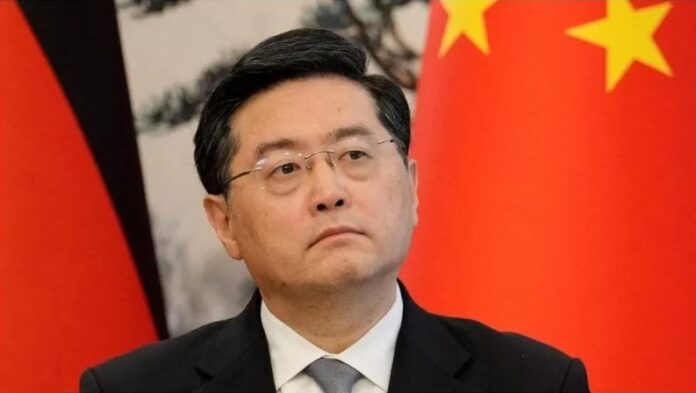Amidst a cloud of mystery surrounding the removal of China’s foreign minister, Qin Gang, there are growing questions about the implications for China’s diplomatic landscape.
After weeks of an unexplained absence, Mr. Qin was abruptly ousted by the Chinese leadership, with even any mention of him being erased from the foreign ministry website.
Experts opine that while this development may not drastically impact foreign relations, it has certainly left Beijing in an awkward position.
Despite being known for his assertive “wolf warrior” persona, Mr. Qin also displayed a softer approach during his tenure as ambassador to the US. He advocated for a more nuanced relationship between the two superpowers and effectively engaged with the American public through sporting events, such as playing basketball at NBA games and throwing pitches at baseball stadiums.
When he was appointed foreign minister last December, it was perceived as a signal that China was aiming to project a less aggressive image, opting for more composed figures on the frontlines of diplomacy. However, it’s important to note that Mr. Qin’s influence over actual foreign policy was limited as he had to answer to Wang Yi, who held the top diplomatic position within China’s party-centric power hierarchy as the head of the Communist Party’s foreign affairs commission. Mr. Wang has now assumed Mr. Qin’s position.
In essence, both Mr. Qin and Mr. Wang ultimately had to align their actions with President Xi’s political and ideological framework. According to Neil Thomas, a fellow in Chinese politics at the Asia Society Policy Institute, Mr. Qin was chosen by Xi not to shape foreign policy but to serve as the executor of Xi Jinping Thought on Diplomacy.
With Mr. Wang swiftly taking charge of both his former and current roles, China aims to convey a sense of continuity and reassure the global community that it’s business as usual. Mr. Wang is well-known internationally and has been involved in China’s charm offensives regarding significant issues like the Ukraine war. His focus is likely to be on stabilizing the US-China relationship after a period of hostility, with President Xi’s potential visit to the US in November considered a top priority.
Despite the apparent smooth transition, there are doubts about Mr. Wang’s long-term tenure as foreign minister, with many speculating that he might be a temporary placeholder while President Xi searches for someone to ease Mr. Wang’s workload.
As China endeavors to replenish its diplomatic engagements after years of Covid-related isolation, Mr. Wang’s dual responsibilities may limit the country’s capacity to interact with officials from smaller nations, particularly concerning its efforts to engage the so-called global south.
The enigmatic removal of Mr. Qin raises concerns about President Xi’s judgment, as he had previously viewed him as a rising star within the leadership. This incident has not only affected the Chinese Communist Party’s image abroad but also led to internal doubts about leadership stability, potential policy disagreements, opaque promotion methods for high-ranking officials, and how it aligns with China’s aspirations to become a global power.
In conclusion, the episode involving Qin Gang serves as a reminder that the diplomats foreign governments and companies often interact with are not always at the core of power in China. Ultimately, it highlights the decisive authority of Xi Jinping in Beijing’s decision-making process.
